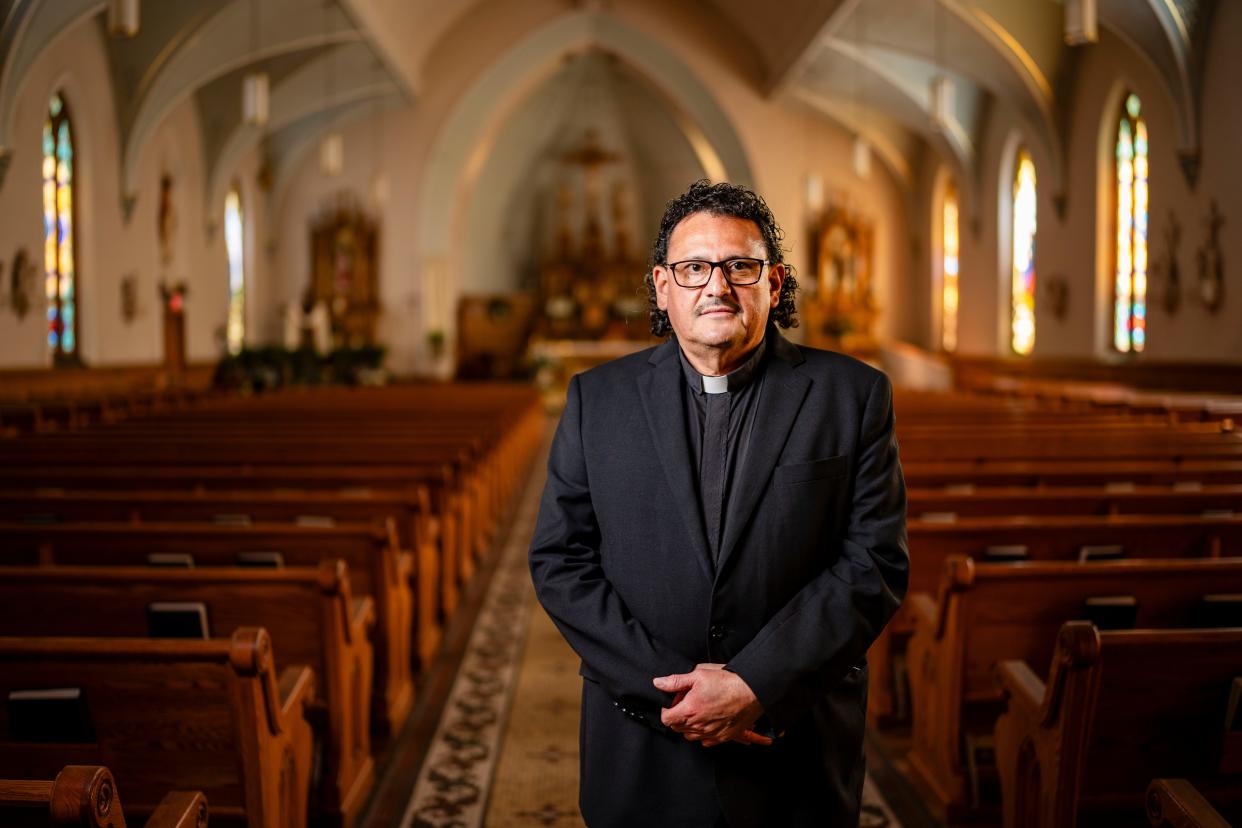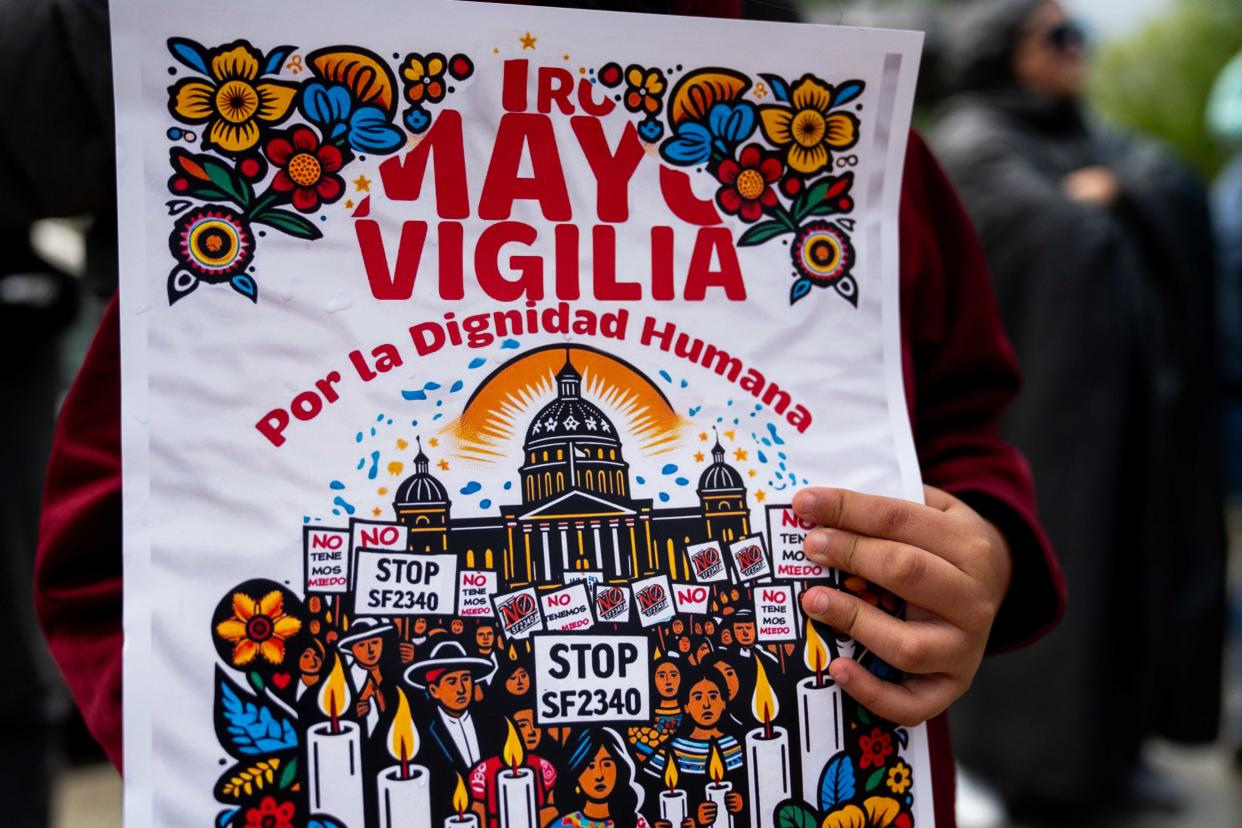'Divisive and harmful': Iowa immigrants fear racial profiling with new 'illegal reentry' law
Memories of his own escape flooded back as the Rev. Nils Hernandez heard that Senate File 2340 — a bill aimed at making illegal immigration a state crime — was signed into law.
Sitting in a pew at Queen of Peace Catholic Church in Waterloo where he is pastor, Hernandez rehashed his journey into exile more than 30 years ago — a move that forced him to leave behind his life and family in Nicaragua with no return date guaranteed. In March 1987, Hernandez was 19 years old and a seminary student in Matagalpa when he led his classmates in a strike against the Nicaraguan government and soon faced threats for his participation.
He said his life and the safety of his loved ones were on the line as he joined the thousands of Nicaraguans in fleeing the country to find refuge. He said he first turned to Guatemala before heading for the United States.

It's a story he says he's told many times before but one that's still tough to remember — especially as Iowa lawmakers continue to crack down on immigration policies and target a population he considers crucial to the state's economy and workforce.
"I feel the pain and the concerns that my brothers and sisters have," said Hernandez, whose pathway to citizenship was long, rocky and at times uncertain. He spoke about being denied political asylum, facing deportation and then returning to the U.S. after being granted a religious visa.
Hernandez, who eventually became a U.S. citizen in 2001 and has lived in Iowa for 30 years, said he knows exactly how stressful the process can be, the risk of being caught and living in what can feel like isolation.
More: Iowa's new immigration law relies on local police, but many doubt they can enforce it
Hernandez, who joined the hundreds of immigrants, activists and supporters last Wednesday in a statewide protest march against SF 2340, said he and many others are scared of the new "illegal reentry" law and the impact it will have on people of color across the state. They say it comes at a time of heightened anti-immigrant rhetoric and promotes racial profiling in communities that are already susceptible to the discriminatory practice and fearful of law enforcement agents.
One community organizer, Gabriel Saldaña, said he isn't surprised the proposed bill became law. Saldaña, who works for the Iowa Migrant Movement for Justice in Des Moines, said lawmakers have passed legislation in recent years targeting other marginalized groups' rights and access to resources, education and programs.
"We've seen attacks on public libraries, the AEA disability community, the trans community," Saldaña said. "They're going after unions and workers. We know the anti-immigrant hysteria is really high right now," with it being a presidential election year.
"If you're not at the table, you're on the menu."
Reynolds: Law gives state power to enforce immigration laws
Last Wednesday, at a rally held in Des Moines, Hoover High School student Alison De Luna was huddled under a canopy with a sign that read: "I should be worried about college not SF 2340." Other families around her held up American flags and colorful posters featuring the phrase "por la dignidad humana" — "for human dignity" in English — in bright red.
Like Hernandez, De Luna, who attended the event to show support for Latino families like hers, said many Iowa immigrants have rebuilt their lives here from scratch. They are scattered across various industries such as agriculture, business and construction. Many of them own stores that are vital to their neighborhoods, and SF 2340 threatens their livelihoods, she said.
Escucha Mi Voz, Latinx Immigrants of Iowa and Iowa City Catholic Worker held the rallies in Iowa City, Waterloo, Des Moines and Davenport on May 1, which is known as May Day and celebrates workers’ rights.

SF 2340 makes it a state crime for someone to be in Iowa if they have been previously deported, removed or denied admission to the U.S. Those arrested face felony charges carrying prison sentences of up to five or 10 years. The law also allows state courts to deport individuals convicted of what it calls "illegal reentry."
"The Biden administration has failed to enforce our nation's immigration laws, putting the protection and safety of Iowans at risk," Iowa Gov. Kim Reynolds said in a statement last month announcing the law signing. "Those who come into our country illegally have broken the law, yet Biden refuses to deport them. This bill gives Iowa law enforcement the power to do what he is unwilling to do: enforce immigration laws already on the books."
The law is similar to one in Texas, which has been blocked by the courts while a lawsuit challenging its constitutionality is decided. The U.S. Department of Justice has said it will sue Iowa to block the law if it remains in effect, and several Iowa police chiefs have said they don't have the resources or knowledge to enforce it.
More: Win some, lose some: How Gov. Kim Reynolds' ambitious legislative agenda fared in 2024
Law 'is so divisive and so harmful,' lawyer says
Rogelio Rodriguez, of Lutheran Services of Iowa, and Allison McCarthy, of the Drake Legal Clinic, said many of their clients have expressed fear in the wake of the new law. They said SF 2340 makes their clients feel unwelcome, and the law's vagueness adds another layer of anxiety.
"It discourages them from just living normal lives," said McCarthy, director of the legal clinic's refugee services and a Drake University law professor. "It discourages them from interacting with local law enforcement when they might really need help or assistance for safety reasons. The climate that's perpetuated by this law is just one that is so divisive and so harmful for people."
Rodriguez said his caseworkers regularly work with children who have some status in the U.S. They could have legal permanence through the Special Immigrant Juvenile visa, which is granted to undocumented immigrants under 21 who have faced abuse, neglect or abandonment by their parents, or Temporary Protected Status, for those who flee their homeland because of war, unstable government or an environmental disaster.
But that doesn't mean they feel "safe" or "comfortable" in the U.S. "It doesn't mean that there's any level of security," he said.
"It's important for us to understand the impact of what a law like this can have on our communities feeling appreciated," Rodriguez continued. "There's an appreciation for diversity throughout the world, and when these laws come into play, it creates a lot more distance between community members because of differences or because of perspectives or opinions.
"There is diversity in Des Moines, maybe not as much as like Chicago or Denver or LA," he continued. "But there is some level of diversity here, and there is an appreciation for diversity here. These laws squash that and really make people kind of go into their corners. There's a disconnect that happens, and that sort of energy, that sort of community does not serve anybody well."
Stephen Gruber-Miller and Galen Bachariercontributed reporting.
F. Amanda Tugade covers social justice issues for the Des Moines Register. Email her at ftugade@dmreg.com or follow her on Twitter @writefelissa.
This article originally appeared on Des Moines Register: Iowa's 'illegal reentry' law ignites fears of racial profiling
